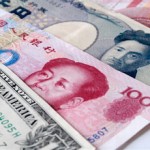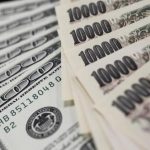Dollar Gains a 7th Week Before Jobs; Yen Drop Spurs Bankruptcies

The dollar headed for a seventh weekly gain, after rising above 120 yen yesterday for the first time since July 2007, as economists predicted U.S. job growth quickened while Japan is in recession and Europe struggles.
The U.S. currency has gained at least 3.8 percent versus all 16 major peers in the past three months amid speculation the Federal Reserve will boost interest rates next year. Corporate bankruptcies in Japan due to the weak yen jumped last month to the most since at least January 2013, an industry survey showed. Malaysia’s ringgit slid to a five-year low as a slump in crude oil prices damped the nation’s growth outlook.
“It’s hard to imagine a weak payrolls report, so the risk for dollar-yen is slanted to the upside,” said Takako Masai, general manager of the markets sub-group at Shinsei Bank Ltd. in Tokyo. “The market is pricing in the potential for a further expansion of monetary stimulus by the Bank of Japan. The dollar may race up to 130 yen by around the end of March.”
The dollar rose 0.3 percent to 120.11 yen at 7:01 a.m. in London, having gained 1.3 percent this week. It reached 120.25 yesterday, the most since July 2007. The greenback climbed 0.1 percent to $1.2370 per euro after advancing to $1.2280 yesterday, the strongest since August 2012. The yen dropped 0.2 percent to 148.58 per euro.
The Bloomberg Dollar Spot Index, which tracks the U.S. currency against 10 major peers, gained 0.7 percent since Nov. 28, set for a seventh weekly advance.
Job Growth
U.S. employers added 230,000 workers in November after hiring 214,000 the previous month, according a Bloomberg News survey before today’s Labor Department report. Payrolls have increased by more than 200,000 for nine straight months.
The Fed will increase its benchmark interest rate in about nine months, based on data compiled by Morgan Stanley, one of the 22 primary dealers that trade with the Fed.
The dollar has surged 7.1 percent in the past three months, the best performer of 10 developed-nation currencies tracked by Bloomberg Correlation-Weighted Indexes. The euro rose 1.8 percent, while the yen slumped 7.6 percent, the biggest decline.
“If the payrolls number is good, dollar-yen will rise, but we’re getting pretty close to the end of this rally,” said Kazuo Shirai, a trader at MUFG Union Bank NA in Los Angeles. “The move has been very fast, without a major correction lower. I don’t think we’ll get to 125 anytime soon.”
Corporate bankruptcies due to the yen climbed to 42 last month, the most since surveys started in January 2013, according to a survey by Teikoku Databank Ltd. Yen-induced bankruptcies have broken a record for three straight months, it said.
Mitsubishi’s View
The yen will depreciate to as weak as 125 per dollar within a few weeks as the Bank of Japan maintains its unprecedented stimulus to revive growth, according to Mitsubishi UFJ Asset Management Co. Japan’s currency has already tumbled almost 16 percent since June 30.
“The Bank of Japan is quite powerful with its bazooka,” approach to monetary policy, said Hideo Shimomura, chief fund investor at Mitsubishi UFJ Asset Management in Tokyo. “Everybody is expecting Federal Reserve hikes. The expectation is for dollar strength and yen weakness.”
The ringgit fell for a third day as the selloff in oil sapped the growth outlook for the net oil-exporting nation.
Benchmark brent crude has slumped 17 percent in the past month as the Organization of Petroleum Exporting Countries decided not to cut output to shore up prices. Malaysia’s exports contracted in October for the first time in 16 months, official data showed today.
Malaysia Suffers
“‘Malaysia is the only Asian country that really doesn’t benefit from lower oil prices,” said Mitul Kotecha, head of Asia currency strategy at Barclays Plc. in Singapore. “Being a net exporter of oil, Malaysia suffers more than others.”
The ringgit declined 0.8 percent to 3.4727 per dollar after depreciating to 3.4757, the weakest since October 2009.
The euro rose from a two-year low yesterday after European Central Bank President Mario Draghi said policy makers will wait to assess if additional stimulus is needed.
“We’re looking for the euro to go down to $1.07 by the end of 2015,” Marvin Barth, head of European foreign-exchange strategy at Barclays Plc in London, said today in a Bloomberg Television interview. “You’ve reached a tipping point in people’s expectations to where the euro is likely to go. The ECB is providing a significant amount of accommodation in conjunction with negative deposit rates.”
Source: bloomberg – Dollar Gains a 7th Week Before Jobs; Yen Drop Spurs Bankruptcies





























